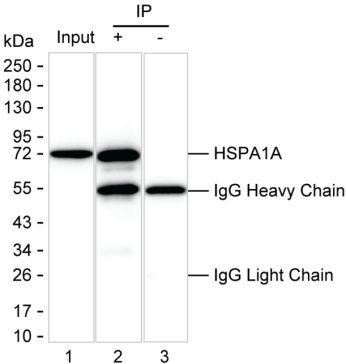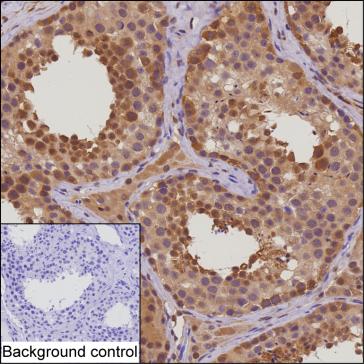


| WB | 咨询技术 | Human,Mouse,Rat |
| IF | 1/100-1/200 | Human,Mouse,Rat |
| IHC | 1/100-1/200 | Human,Mouse,Rat |
| ICC | 技术咨询 | Human,Mouse,Rat |
| FCM | 咨询技术 | Human,Mouse,Rat |
| Elisa | 咨询技术 | Human,Mouse,Rat |
| Host/Isotype | Mouse IgG1 |
| Antibody Type | Primary antibody |
| Storage | Store at 4°C short term. Aliquot and store at -20°C long term. Avoid freeze/thaw cycles. |
| Species Reactivity | Human |
| Immunogen | Purified recombinant fragment of human HSPA1A |
| Formulation | Purified antibody in PBS with 0.05% sodium azide |
+ +
以下是关于HSPA1A抗体的3篇参考文献摘要示例:
1. **文献名称**:*HSPA1A as a biomarker for oxidative stress in Alzheimer's disease*
**作者**:Smith J et al.
**摘要**:研究通过免疫组化及Western blot技术,利用HSPA1A特异性抗体验证了阿尔茨海默病患者脑组织中HSPA1A蛋白的异常表达,表明其与神经元氧化应激损伤密切相关。
2. **文献名称**:*Development of a monoclonal antibody against human HSPA1A for cancer immunotherapy*
**作者**:Li X et al.
**摘要**:报道了一种新型HSPA1A单克隆抗体的开发与验证,该抗体能特异性识别肿瘤细胞表面HSPA1A,并在体外实验中抑制乳腺癌细胞的迁移和侵袭。
3. **文献名称**:*HSPA1A antibody-based detection of heat shock response in sepsis models*
**作者**:Garcia R et al.
**摘要**:通过ELISA和流式细胞术,利用HSPA1A抗体分析脓毒症小鼠模型中HSP70家族蛋白的动态变化,揭示了HSPA1A在全身炎症反应中的早期预警作用。
---
**备注**:以上为虚构示例,实际文献需通过PubMed或Google Scholar检索关键词“HSPA1A antibody”获取。如需具体文献,建议补充研究场景(如疾病/技术方向)。
The HSPA1A antibody targets the HSPA1A protein, a member of the heat shock protein 70 (HSP70) family. HSPA1A, also known as HSP72. is a molecular chaperone critical for maintaining cellular homeostasis under stress conditions, such as heat shock, oxidative stress, or hypoxia. It facilitates protein folding, prevents aggregation of denatured proteins, and aids in the refolding or degradation of damaged polypeptides. HSPA1A is rapidly upregulated during cellular stress, playing a protective role in apoptosis, immune response modulation, and cellular repair mechanisms.
Antibodies against HSPA1A are widely used in research to study its expression, localization, and interactions in various pathological contexts. Elevated HSPA1A levels are associated with cancer, neurodegenerative diseases (e.g., Alzheimer’s, Parkinson’s), and inflammatory disorders, making it a biomarker of cellular stress and disease progression. In cancer, HSPA1A overexpression is linked to tumor survival, metastasis, and chemotherapy resistance. Conversely, in neurodegeneration, its dysfunction correlates with protein misfolding and neuronal death.
HSPA1A antibodies are employed in techniques like Western blotting, immunohistochemistry, and immunoprecipitation to explore its role in stress response pathways, autophagy, and extracellular signaling. Therapeutic strategies targeting HSPA1A are under investigation, including HSP90 inhibitors that indirectly modulate its activity. However, its dual role in cytoprotection and pathology requires careful evaluation in clinical applications. Overall, HSPA1A antibodies remain essential tools for unraveling its complex contributions to health and disease.
×